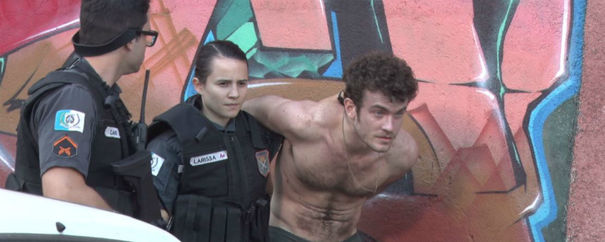Intervention and the bomb-movie
By Bruno Galindo

Intervenção
Intervenção (Intervention, Brazil, 2019), a film directed by Caio Cobra and produced by Mídia Bridge, had its première at a gala screening of Rio de Janeiro Int’l Film Festival. Guided by the process of the attempted “pacification process” in which the state’s government installed UPPs (“peacekeapers police units”, in a litteral translation) through the hills of Rio, and trying to take off (using many drone images) towards a repetition of the phenomenon Tropa de elite (Elite Squad, 2007), the film lands, at most, as a Golden Raspberry strong contender.
We could talk, at first, about how some shots of the movie seem to be directed by my 6-year-old brother who dreams of being a Youtuber – the inability to reproduce the format of cell phone recorded images is impressive. We could also talk about scenography reproductions of the favela as those of the Espaço Favela in Rock In Rio - the sequence of the glass of beer on the pool table by the sound of samba singer Dudu Nobre in front of a police car is unbelievably bad. Or we could talk about the embarrassing appeal to slogans such as “What’s up, boss?”, “I am the commander”; “Don’t trap the rat”, are some of the most iconic examples. Not to mention how the film manages to waste the talent of Zezé Motta, André Ramiro and Babu Santana all at the same time. You thought it was just that, my boss? There is more.
The scene of the stolen truck in which people from the favela, like cannibals, lunge over LCD TVs is one of the scariest things Brazilian cinema produced in 2019: immoral because it simply invents a favela and throws this favela on the screen; anti-ethical because it does not care about the reception of these images, and harmful because it corrupts the representation of the favelas of Rio. The voice of a spectator whose name or face I do not know, punctuated this at the end of the screening, and this critic only said thank you.
In a filmic gesture that ends up depicting in a recreational way spaces as complex as the hills of Rio de Janeiro, Cobra's film and team seem so interested in talking about weapons, urban warfare and civil violence that it turns to be itself the greatest symbol of those conflicts: a great and thunderous bomb.

